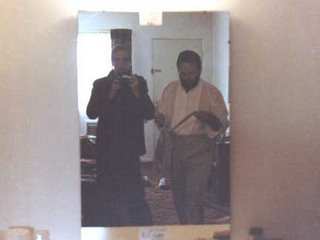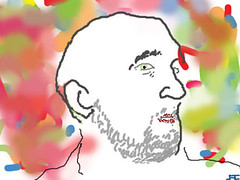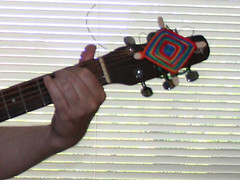"Spiritual Experience"; I first wrote about that experience here. Sue, writing at "Inner Dorothy," describes a negative experience of a sweat lodge among her responses here (see her answers to #4).
She says she had felt pressured to have a "deep spiritual experience," which would be a "life changing moment." When neither of these things happened, she felt manipulated.
I understand this feeling of being pressured to have a spiritual experience. I can still remember when I was a freshman in high school, and a pair of Baptists cornered me. It became clear the only way I was going to get rid of them was to say their prayer and claim to have had a spiritual experience.
I wonder what we mean when we say "spiritual experience". I suppose most of us picture something similar to scenes described in the Bible — Moses at the burning bush; Jacob seeing the ladder to heaven; Jesus on the mountain top with Elijah and Moses. And if we don't experience something like one of these "mountain top" experiences, we suppose that our experience has not been spiritual.
I suspect what is at work here is a common, almost Manichean, duality: our daily life and perceptions are worldly; the spiritual is something other. Heaven is somewhere out there, somehow above and beyond us. Humans are crass physical beings who rarely experience the spiritual.
I don't think the Bible supports this view. Take the Yahwehist account of creation in Genesis 1 as an example. Yahweh speaks things into being, beginning with light. It seems as if Yahweh is making distinctions between darkness and light, earth from sky, and land from water. We normally consider these things opposites, yet Yahweh refers to each thing as good; and at the conclusion of the sixth day (at Gen 1:31), Yahweh proclaims the entire creation "very good."
One of the things I understand this passage to mean is that physical objects have a spiritual origin. With the proper vision, I would perceive the spiritual heart of the physical order – including myself.
I suggest that a spiritual experience is not something imposed from outside. It is, rather, an openness that begins within us. People take pilgrimages seeking spiritual experience. People go into sweat lodges seeking a spiritual experience. People climb sacred mountains.
In each case, people push themselves to an extreme. These extremes may wear down defenses, and exhaust expectations. Which may help one be more attuned to spiritual reality, rather than the dull surface we expect.
Pushing oneself to these extremes is, to borrow William Blake's image, a means of "cleansing the doors of perception" so we perceive the world "as it is, "Holy."
I don't know that it's necessary to push ourselves to extremes. It's certainly unreasonable to pressure, or expect, a person to have a "spiritual experience" under these circumstances.
I should think the goal is to remain receptive. We could expect each moment to be an opportunity to encounter spiritual reality. We could follow the example of this artist, who carefully details the ordinary events of her day as a search for enlightenment (scroll down her page, and begin reading at July 20).

















